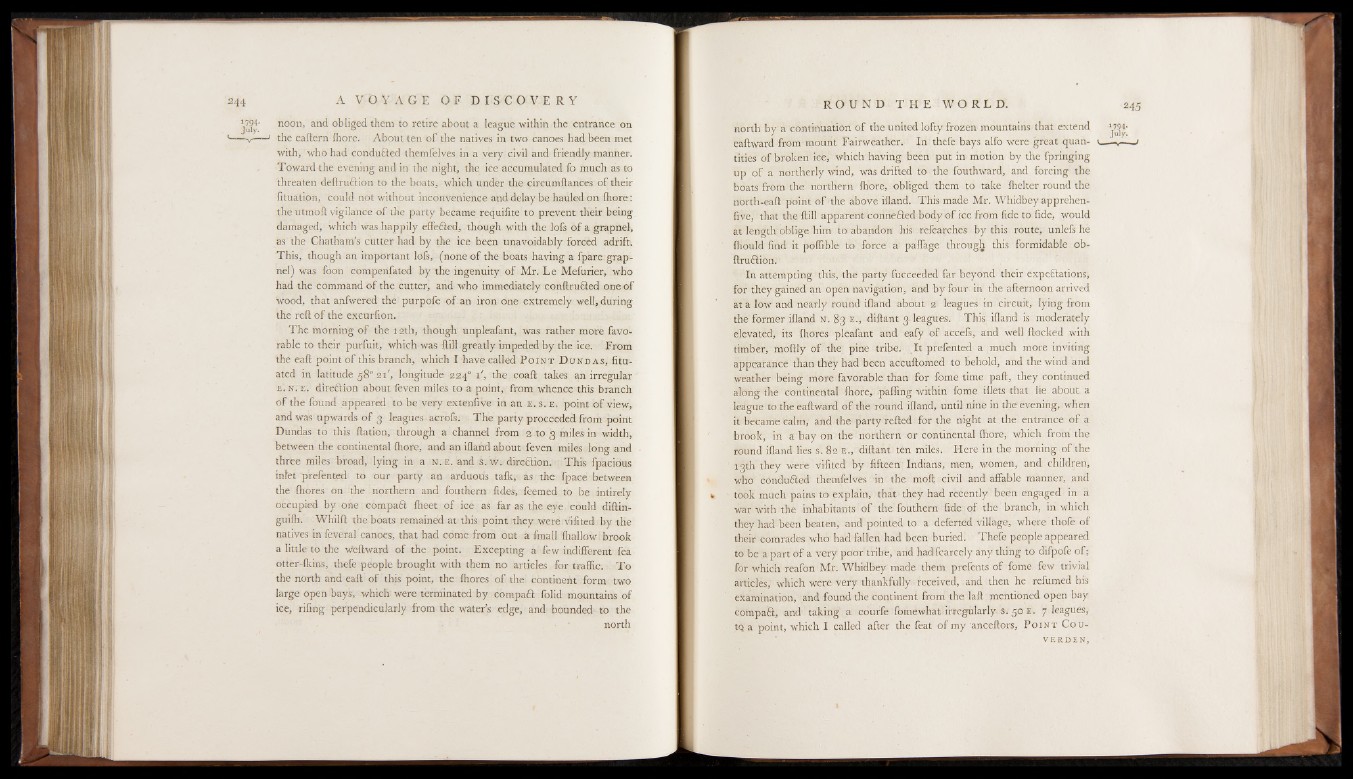
244
V794- noon, and obliged them to retire about a league within the entrance on July. - 0 p .
1--- y-— 1 the eaftern Ihore. About ten of the natives in two canoes had been met
with, who had condufted themfelves in a very civil and friendly manner.
Toward the evening and in the night, the ice accumulated fo much as to
threaten deftruftion to the boats, which under the circumftances of their
fituation, could not without inconvenience and delay be hauled on Ihore:
the utmoft vigilance of the party became requifite to prevent their being
damaged, which was happily effefted, though with the lofs of a grapnel,
as the Chatham’s cutter had by the ice been unavoidably forced adrift.
This, though an important lofs, (none of the boats having a fpare grapnel)
was foon compenfated by the ingenuity of Mr. Le Mefurier, who
had the command of the cutter, and who immediately conftrufted one of
wood, that anfwered the purpofe of an iron one extremely well, during
the reft of the excurfion.
The morning of the 1 2th, though unpleafant, was rather more favorable
to their purfuit, which was ftill greatly impeded by the ice. From
the eaft point of this branch, which I have called P o i n t D d n d a s , fitu-
ated in latitude 58° 21', longitude 224° 1', the coaft takes an irregular
E. N. e. direftion about feven miles to a point, from whence this branch
of the found appeared to be very extenfive- in an e . s. e, point of view,
and was upwards of 3 leagues acrofs. The party proceeded from point
Dundas to this ftation, through a channel from 2 to 3 miles in width,
between the continental Ihore, and an ifland about; feven miles long and
three miles broad, lying in a n. e. and s .w . direftion. This fpacious
inlet prefented to our party an arduous talk,- as the fpace between
the Ihores on the northern and fouthern fides, feemed to be intirely
occupied by one compaft Iheet of ice as far as the eye. could diftin-
guilh. Whilft the boats remained at this point they were vilited by the
natives in feveral canoes, that had come from out a fmall fhallow: brook
a little to the Veftward of the. point. Excepting a few indifferent fea
otter-lkins, thefe people brought with them no articles for traffic. To
the north and eaft of this point, the fhoresof the continent form two
large open bays, which were terminated by compaft folid mountains of
ice, riling perpendicularly from the water’s edge, and bounded' to the
north
north by a continuation of the united lofty frozen mountains that extend
eaftward from mount Fairweather. In thefe bays alfo were great quantities
of broken ice, which having been put in motion by the fpringing
up of a northerly wind, was drifted to the fouthward, and forcing the
boats from the northern Ihore, obliged them to take fhelter round the
north-eaft point of 'the above ifland. This made Mr. Whidbey apprehen-
fi ve, that the ftill apparent connefted body of ice from fide to fide, would
at length oblige him to abandon his refearches by this route, unlefs he
fhould find it poffible to force' a paffage through this formidable ob-
ftruftion.
In attempting this, the party fucceeded far beyond their expeftations,
for they gained an open navigation, and by four in the afternoon arrived
at a low and nearly round ifland about 2 leagues in circuit, lying from
the former ifland n . 83 e ., diftant 3-leagues. This ifland is moderately
elevated, its fhores pleafant and eafy of accefs, and well flocked with
timber, moftty off the pine tribe. It prefented a .much more inviting
appearance than they had been accuftomed to behold, and the wind and
weather being more favorable than for fome time pall, they continued
along the continental fhore, pafling within fome iflets that lie about a
league to the eaftward of the round ifland, until nine in the evening, when
it became calm, and the party refted for the night at the entrance o f a
brook, in a bay on the ’ northern or continental fhore, which from the
round ifland lies s. 82 E., diftant ten miles. Here in the morning of the
13th they were vifited by fifteen Indians, men, women, and children,
who condufted themfelves in the moil ’ civil and affable manner, and
took much pains to explain, that they had recently been engaged in a
war with the inhabitants' of the’ fouthern fide; of the branch, in which
they had been beaten, and pointed to a deferted village, where thofe of
their comrades who had fallen had been buried. Thefe people appeared
to be a part of a very poor1 tribe, and hadfcarcely any thing to difpofe of;
for which reafon Mr. Whidbey made1 them prefents of fome few trivial
articles) which were very thankfully received, and then he refumed his
examination, and found the continent from the laft mentioned open bay
compaft, and taking a courfe fomewhat irregularly, s. 50 e . 7 leagues,
tq a point, which I called after the feat of my anceftors, Point Cou-
VERDEN,